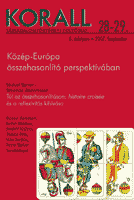Állam, nemesség és civil társadalom. Nemesi címadományozások Csehországban és Sziléziában, 1806–1871
State, nobility and civil society. Awarding noble titles/ennoblements in Bohemia and Silesia, 1806–1871
Author(s): Rudolf KučeraSubject(s): History
Published by: KORALL Társadalomtörténeti Egyesület
Summary/Abstract: The article addresses the relation between the state and emerging civil society value-patterns in 19. century Central Europe. The practice of ennoblements is used as a main tool to analyze the particular positions taken by the state towards such patterns. It is argued that the noble status still retained its high symbolic value within 19. century Central European societies. The state could therefore use ennoblements to reward certain sets of virtues and patterns of behaviour by publicly honouring individuals who embodied them, at the same time inspiring the wider public to follow such patterns. Using a comparative approach, the article follows the emergence and developments of arguments accepted by the state as reasons for ennoblement in Bohemia and Silesia and the positions of the civil society practices within them. It is argued that there were substantial divergences between the two main central European states, e.g. Austria and Prussia in this regard. While during roughly the first thirty years of the 19. century practices like voluntary charity, support or direct engagement in different types of associations were rewarded by only little state appraisal in the form of granting noble status in both cases, after the 1830’s a significant change could be observed. Presenting both the social historical quantitative analysis of the new nobility and the qualitative evidence drawn from concrete cases of ennoblements, it is argued that from the 1830’s onwards, Austria started to include civil society social practices into the set of criteria for ennoblements. Not only did professions connected with the emergence of the civil society, such as businessmen, academics or artists begin to play an increasingly larger role among the ennobled in Bohemia than in Silesia, but the qualitative evidence of particular cases also shows that these professions reached the noble status precisely due to their civil society engagement and not only, as in Prussia, due to their property and social connections. After the 1830’s even some non-traditional civil society actors, such as state bureaucrats, tried to back their ennoblement claims with much wider set of arguments, gradually including even some social practices connected with the civil society. The set of the state criteria for creating the social elite was therefore significantly different in Bohemia and Silesia. While during the 19th century the Austrian state incorporated civil society practices into the picture of the social elite, the Prussian position remained much more rigid. In Silesia, it was still the old virtues of property and wide social connections, which served as the main credits for obtaining the noble title. The Austrian state thus supported the emerging civil society during the years 1806 – 1871 in a much more signifi cant way than the Prussian did.
Journal: Korall - Társadalomtörténeti folyóirat
- Issue Year: 2007
- Issue No: 28-29
- Page Range: 31-58
- Page Count: 28
- Language: Hungarian

